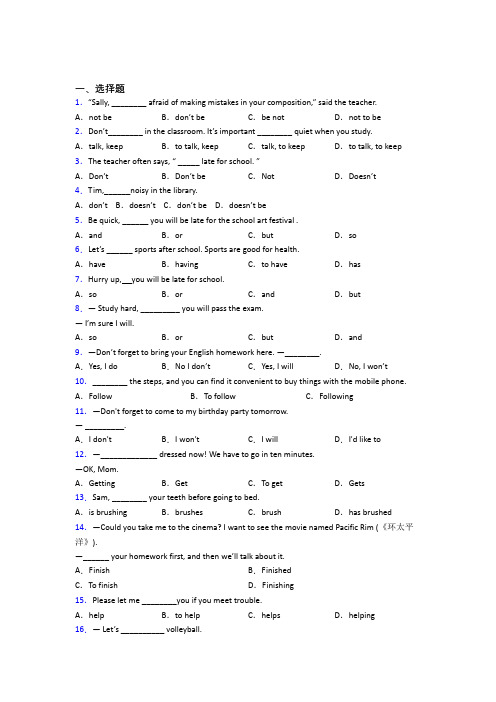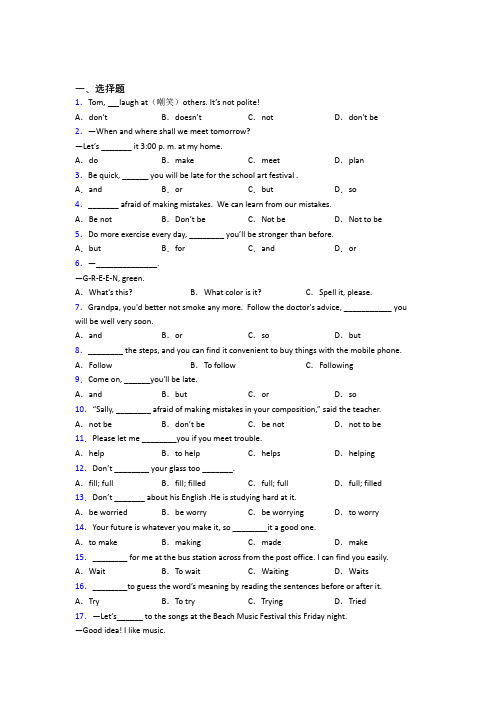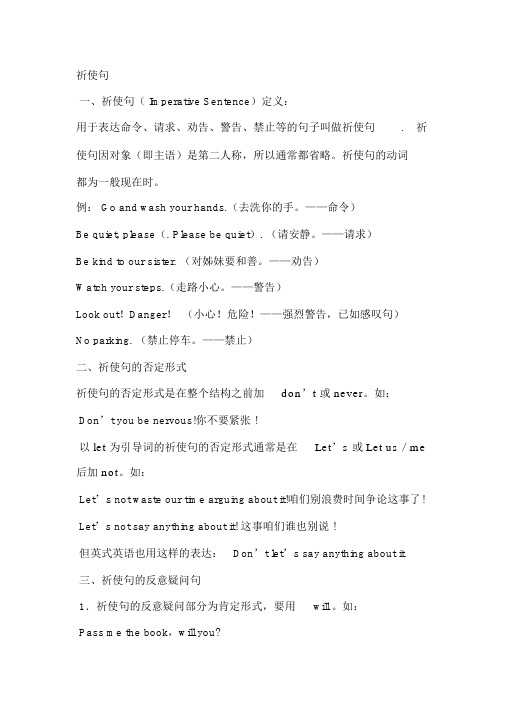最新初中英语祈使句讲解及练习
祈使句的结构及用法(附练习题与答案)

• 4. No+/名词以上结构表示禁止,多用于公共场合的标牌或警示语。
• 例如:No littering.禁止乱扔垃圾。
•
No photo.禁止拍照。
• 注意:为了加强祈使句的语气,我们通常在祈使句的动词原形前加上助动词do,此时译为“一定,务必”。例 如:Do lock the door.务必要锁上门。Do write carefully. 一定要仔细写。巧记口诀祈使句巧记口诀祈使句 无主语,主语you常省去;动词原形在句首,加上please较客气。变为否定很容易,句首don't莫忘记。
• 3. Let型(1)肯定句: Let+宾语+动词原形+其他成分。
• 例如:Let me help you.让我来帮你。
• (2)否定句:don't+let+动词原形+其他成分。或Let+宾语+not+动词原形+其他成分。
• 例如:don't let her cross the street alone.= Let her not cross the street alone.不要让她单独过马路。
祈使句
• 祈使句的种类 • 1. Do型 • (1)肯定句:动词原形(+宾语)+其他成分。 • 例如:Open the door.开门。 • Please have a seat here.请这边坐。 • (2)否定句:don't+动词原形(+宾语)+其他成分。 • 例如:don't watch TV. 不要看电视。 • 2. Be型 • (1)肯定句:Be+表语(名词或形容词)+其他成分。 • 例如: Be a good boy!要做一个好孩子!Be quite, please!请安静! • (2)否定句:don't be+表语。例如:don't be late.不要迟到。
初中英语祈使句讲解及练习

初中英语祈使句讲解及练习初中英语――祈使句祈使句指的是表示命令、请求、建议或劝告的句子。
其主语you常省略,谓语动词用原形,句末用感叹号或句号,读降调。
1. 肯定的祈使句(1)动词原形+其他Stand up, please. = Please stand up. 请起立。
(2)Be + n./adj.Be a good boy! 要做一个好孩子! Be careful! = Look out! = Take care! 小心/ 当心!(3)Let + 宾语+ 动词原形+ 其它成分Let me help you. 让我来帮你。
Let’s go to school together. 咱们一起上学去吧。
2. 否定的祈使句(1) Don't + 动词原形Don't stand up. 别站起来。
Don't be careless. 别粗心。
Don't let them play with fire. 别让他们玩火。
(2)Let型的否定式有两种:“Don't + let + 宾语+ 动词原形+ 其它成分”和“Let + 宾语如:--- Don’t go out, please. It’s raining heavily outside. 请不要出去。
外面雨下得很大。
---- Yes, I will. I have to meet my brother at the airport. 不行,我得去机场接我弟弟。
5. 祈使句的反意疑问句(1) 肯定祈使句的反意疑问句反问部分用will you 或won't you。
Please open the do or, will/ won’t you? 请把门打开,好吗?(2) 否定祈使句的反意疑问句反问部分只用will you。
Don't be late again, will you? 别再迟到了,行不行?(3) 以let's开头的祈使句反意疑问句反问部分用shall we。
初中英语祈使句讲解

祈使句(一)概念:用来表示请求、命令、叮嘱、邀请、劝告的句子是祈使句。
(二)一般祈使句(省略第二人称主语you)1.肯定句:动词原形+⋯⋯Bebrave.Standup.Stoptalking!Comeonandjoinus!a.有时,为了加强语气,可以在动词之前加do.Dostudyhard.Dositdown.b.为了使语气显得客气,可在祈使句的句首或句尾加上please.Please在句尾时,之前一定要加一个逗号。
Pleasecomehere.Gothisway,please.c.祈使句有唤语,一定要用逗号隔开,放在句首或句尾。
LiMing,comehere.Hereyouare,Eric.2.否定Don’tswimintheriver.1/4Don’tbelate.Pleasedon’tbenoisy.Don’ttellher,please.(三)Let祈使句(含有第一、三人称主语)1.肯定句:Letsb.dosth.Let’sgoswimmingonSunday.Letmetryagain.LetTomgotherehimself.Letthenewsbeknown.Leteachmandecideforhimself.2.否定句:Letsb.notdosth.或Don’tletsb.dosth.Don’tletherwastetime.Don’tlethimhearyousaythat.Lethernotdoitalone.Let’snotsaya n y t h a i n b g o u t it.Don’tletthemplaywithfire.3.注意:Let’表s示包括对方。
Letus表示不包括对方。
Let’sgo,shallwe(?包括对方)Letusgo,willyou?(请求对方许,不包括对方)(四)句型转换:祈使句+and/or+陈述句祈使句相当于if引导的条件状语从句。
(完整版)初中英语祈使句讲解及练习

(完整版)初中英语祈使句讲解及练习初中英语――祈使句祈使句指的是表示命令、请求、建议或劝告的句子。
其主语you 常省略,谓语动词用原形,句末用感叹号或句号,读降调。
1. 肯定的祈使句(1)动词原形 +其他Stand up, please. = Please stand up. 请起立。
(2)Be + n./adj.Be a good boy! 要做一个好孩子 ! Be careful! = Look out! = Take care! 小心 / 当心!(3)Let + 宾语 + 动词原形 + 其它成分Let me help you.让我来帮你。
Let ' s go to school together.咱们一起上学去吧。
2. 否定的祈使句(1) Don't + 动词原形Don't stand up. 别站起来。
Don't be careless. 别粗心。
Don't let them play with fire. 别让他们玩火。
(2) Let 型的否定式有两种:“Don't + let + 宾语 + 动词原形 + 其它成分”和“ Let + 宾语 + not +动词原形 + 其它成分” 。
Don't let him go. / Let him not go. 别让他走。
Let them not play with fire. 别让他们玩火。
(3) no 开头 ,用来表示禁止性的祈使句。
No smoking! 禁止吸烟 !No fishing! 禁止钓鱼 !3. 祈使句的强调形式,通常在肯定祈使句式前加上助动词 Do 。
例如: Do shut up! 快住口!4. 祈使句的回答祈使句的动作通常是表示将来发生的动作,所以回答祈使句时,一般用 will 或won ' t 。
在回答具有否定意义的祈使句时,要注意两点:1)形式一致(即Yes 与will 保持一致;No 与won ' t 保持一致)2)意思相反(即 Yes 是“不”的意思; No 是“是”的意思)。
最新初中英语语法知识—祈使句的技巧及练习题附答案

一、选择题1.“Sally, ________ afraid of making mistakes in your composition,” said the teacher.A.not be B.don’t be C.be not D.not to be 2.Don’t________ in the classroom. It’s important ________ quiet when you study. A.talk, keep B.to talk, keep C.talk, to keep D.to talk, to keep 3.The teacher often says, “ _____ late for school. ”A.Don’t B.Don’t be C.Not D.Doesn’t 4.Tim,______noisy in the library.A.don’t B.doesn’t C.don’t be D.doesn’t be5.Be quick, ______ you will be late for the school art festival .A.and B.or C.but D.so6.Let’s ______ sports after school. Sports are good for health.A.have B.having C.to have D.has7.Hurry up, you will be late for school.A.so B.or C.and D.but8.— Study hard, _________ you will pass the exam.—I’m sure I will.A.so B.or C.but D.and 9.—Don’t forget to bring your English homework here. —________.A.Yes, I do B.No I don’t C.Yes, I will D.No, I won’t 10.________ the steps, and you can find it convenient to buy things with the mobile phone. A.Follow B.To follow C.Following11.—Don't forget to come to my birthday party tomorrow.— _________.A.I don't B.I won't C.I will D.I'd like to 12.—_____________ dressed now! We have to go in ten minutes.—OK, Mom.A.Getting B.Get C.To get D.Gets 13.Sam, ________ your teeth before going to bed.A.is brushing B.brushes C.brush D.has brushed 14.—Could you take me to the cinema? I want to see the movie named Pacific Rim (《环太平洋》).—______ your homework first, and then we’ll talk about it.A.Finish B.FinishedC.To finish D.Finishing15.Please let me ________you if you meet trouble.A.help B.to help C.helps D.helping 16.—Let’s __________ volleyball.— That __________ good.A.playing;sounds B.play;soundsC.play;sound D.plays;sound17.—Let’s______ to the songs at the Beach Music Festival this Friday night.—Good idea! I like music.A.listening B.listen C.listens D.to listen 18._____ hard and you’ll succeed sooner or later.A.Study B.To studyC.Studying D.Studied19.—Millie,______ late for school again.—Sorry, I ______.A.don’t; a m not B.won’t be; don’t C.don’t be; won’t D.won’t be; won’t 20.—Miss Green, would you please tell me how to improve my English?—_____ a study group, and you’ll get help from others.A.Join B.Joining C.To join D.If you join 21.Let's __________ tennis in the playground.()A.play B.to play C.plays D.to plays22.o music to make you feel happy when you are sad.A.To listen B.Listens C.Listening D.Listen 23.Don't be late for school again, _________?A.do you B.don't you C.won't you D.will you 24.—I am feeling ill. What should I do?— eating junk food and breakfast every day.A.Stop; having B.Stop; have C.To stop; have. D.To stop; to have 25.Hurry up, _________ you will be late for class.A.and B.or C.but D.so【参考答案】***试卷处理标记,请不要删除一、选择题1.B解析:B【解析】【详解】句意:老师说:“萨利,不要害怕在作文中犯错误。
中考初中英语祈使句讲解及练习 (2)

中考初中英语祈使句讲解及练习初中英语――祈使句一、概念:祈使句指的是表示命令、请求、建议或劝告的句子。
二、句型结构:1、肯定句:2、否定句:1. 肯定的祈使句(1)动词原形+其他Stand up, please. = Please stand up. 请起立。
(2)Be + n./adj/prep短语.Be a good boy! 要做一个好孩子!Be careful! = Look out! = Take care! 小心 / 当心!(3)Let + 宾语 + 动词原形 + 其它成分Let me help you. 让我来帮你。
Let’s go to school together. 咱们一起上学去吧。
2. 否定的祈使句(1) Don't + 动词原形Don't stand up. 别站起来。
Don't be careless. 别粗心。
Don't let them play with fire. 别让他们玩火。
(2)Let型的否定式有两种:“Don't + let + 宾语 + 动词原形 + 其它成分”和“Let + 宾语 + not + 动词原形 + 其它成分”。
Don't let him go. / Let him not go. 别让他走。
Let them not play with fire. 别让他们玩火。
(3)no开头,用来表示禁止性的祈使句。
No smoking! 禁止吸烟!No fishing! 禁止钓鱼!No photos!三、练习一. 用括号内所给动词的适当形式填空。
1.It’s an important meeting. _________________ (not, be )late.2.________________ (not,make) any nise! Your mother is sleeping.3.________________ (not, speak) with your mouth full of food and _________ (be) polite.4. ________________ ( not, talk) and ____________ (read) aloud.5._______________ (not,leave) your homework for tomorrow, Larry.6.________________ (look) out! A car is coming.7._______________ (give) us ten years and just see what our country will be like.二、单项选择1. The TV is too loud. Please________. A.turn it down B. to turn it down C. turn down it D. to turn down it2. _______ late again, Bill!A. Don't to beB. Don't beC. Not beD. Be not3. _______ cross the road until the traffic lights turn green.A. NotB. Won'tC. Doesn'tD. Don't4. Please help me carry it, ______?A. will IB. will youC. shall ID. shall we5. Don't make so much noise, ______?A. will youB. won't youC. shall weD. do you6. Do you know the girl ______under the tree?A. standB. to standC. standingD. stood7. Kate, _______ your homework here tomorrow.A. bringB. bringsC. to bringD. bringing8. ________ me the truth, or I'll be angry.A. TellingB. To tellC. ToldD. Tell9. I've kept the dog _______Maomao for a long time.A. NameB. namedC. namingD. to name10. Don't you know that _______ is good for our health?A. swimB. swimmingC. swamD. swims11 .Her doctor said: “________ work so hard”A StopB Don’tC Can’tD No14. ________him the secret, will you?A Don’t tellB Not to tellC Not tellingD No telling15. ________ in bed. It’s bad for your eyes.A Not to readB Don’t readC Don’t to readD Not read16. ________ Your child. We’ll look after him.A Not to worry aboutB Don’t worry aboutC Not worry forD Don’t worry with20.Please ________ look outside. Look at the blackboard.A notB don’tC aren’tD can’t三、句型转换1. Will you please read it again more slowly? (改为祈使句)_______ ________ again more slowly, please.2. If you don't listen to me, I'll go. (改为同义句)________ ________me, or I’ll go.4. The teachers often tell the students not to be careless. (改为祈使句)_______ _______careless, please.5. Please sit next to Nancy. (改为否定句)_______ _______ next to Nancy.6. Don't forget to turn off the lights, please. (改为反意疑问句)Don't forget to turn off the lights, _______ _______?7. If you move, you'll die. (改为同义句)_______ ______, or you'll die.二、英语书面表达专项训练2.如今,很多城市出现了一种绿色出行方式――共享单车(bike-sharing),它因环保、便捷而备受青睐,但同时也引发了一些问题。
初中祈使句类型及练习

●肯定结构:1. Do型(即:动词原形(+宾语)+其它成分)。
如:Please have a seat here. 请这边坐。
有的祈使句在意思明确的情况下,动词可省略。
如:This way, please. = Go this way, ple ase. 请这边走。
2. Be型(即:Be + 表语(名词或形容词)+其它成分)。
如:Be a good boy! 要做一个好孩子!3. Let型(即:Let + 宾语 + 动词原形 + 其它成分)。
如:Let me help you. 让我来帮你。
●否定结构:1. Do型和Be型的否定式都是在句首加don't构成。
如:Don't forget me! 不要忘记我!Don't be late for school! 上学不要迟到!2. Let型的否定式有两种:“Don't + let + 宾语 + 动词原形 + 其它成分”和“Let + 宾语 + not + 动词原形 + 其它成分”。
如:Don't let him go. / Let him not go. 别让他走。
3. 有些可用no开头,用来表示禁止性的祈使句。
如:No smoking! 禁止吸烟!No fishin g! 禁止钓鱼! 表示禁止时,尤其是标语等也可用“No+名词/动名词”来表示。
No parking!No entry!No litter!"Let"后头除了是不带"to"的不定式动词 (The infinitive without"to")之外,还可以是某些适当的副词,如out, in, down, alone等:(13) Let the puppy out.(14) Open the windows and let the fresh air in.祈使句专项练习一、用括号内所给动词的适当形式填空。
初中英语祈使句讲解

初中英语祈使句讲解祈使句是表示请求、命令、建议或劝告的句子类型。
当我们想要向他人提出请求、给予命令、提出建议或劝告时,可以使用祈使句。
以下是初中英语中常见的祈使句及其用法:1. 单词开头的祈使句单词开头的祈使句- Verb + Object:Verb + Object:- Close the door.(关上门。
)- Study the lesson.(研究这个课程。
)- Verb only:Verb only:- Wake up.(醒来。
)- Listen.(听。
)2. Modal verb + Verb:Modal verb + Verb:- Can you help me?(你可以帮助我吗?)- Could you please pass me the book?(请你把书递给我好吗?)3. Let's + Verb:Let's + Verb:- Let's go shopping.(我们去购物吧。
)- Let's play soccer.(我们去踢足球吧。
)4. Don't + Verb:Don't + Verb:- Don't be late.(不要迟到。
)- Don't forget your homework.(别忘了你的作业。
)5. Please + Verb:Please + Verb:- Please be quiet.(请保持安静。
)- Please open the window.(请打开窗户。
)需要注意的是,祈使句的主语通常省略,因为它的主语是默认为“你”或一个群体。
希望以上内容对你理解初中英语祈使句有所帮助。
如有疑问,请随时向我提问。
英语祈使句讲法及练习和答案

祈使句一、祈使句(Imperative Sentence)定义:用于表达命令、请求、劝告、警告、禁止等的句子叫做祈使句. 祈使句因对象(即主语)是第二人称,所以通常都省略。
祈使句的动词都为一般现在时。
例:Go and wash your hands. (去洗你的手。
——命令)Be quiet, please.(Please be quiet.)(请安静。
——请求)Be kind to our sister. (对姊妹要和善。
——劝告)Watch your steps. (走路小心。
——警告)Look out!Danger!(小心!危险!——强烈警告,已如感叹句)No parking. (禁止停车。
——禁止)二、祈使句的否定形式祈使句的否定形式是在整个结构之前加don’t或never。
如:Don’t you be nervous!你不要紧张!以let为引导词的祈使句的否定形式通常是在Let’s或Let us/me 后加not。
如:Let’s not waste our time arguing about it! 咱们别浪费时间争论这事了! Let’s not say anything about it! 这事咱们谁也别说!但英式英语也用这样的表达:Don’t let’s say anything about it. 三、祈使句的反意疑问句1.祈使句的反意疑问部分为肯定形式,要用will。
如:Pass me the book,will you?2.Let’s表示第一人称的祈使句,反意疑问句为“Shall we?”。
如: Let’s go for a walk,shall we?Let’s forget it,shall we?3.Let me和Let us 表示第二人称的祈使句,反意疑问句为“will you?”。
如:Let us go for a walk,will you?4.其它行为动词引起的祈使句,无论其陈述部分是否定还是肯定的祈使句,多用“will you?”,表一种客气的语气。
(完整版)初一祈使句练习及讲解

1 祈使句(Imperative Sentence)1.1 定义用于表达意愿、命令、请求、劝告、警告、禁止等的句子叫做祈使句,祈使句最常用于表达命令,因此在学校文法中也常称为命令句。
祈使句因对象(即主语)是第二人称,所以通常都省略。
祈使句的动词都为一般现在时,句末则使用句号或感叹号来表示结束,读时用降调。
例:Go and wash your hands. (去洗你的手。
——命令)Be quiet, please.(Please be quiet.)(请安静。
——请求)Be kind to our sister. (对姊妹要和善。
——劝告)Watch your steps. (走路小心。
——警告)Look out!Danger!(小心!危险!——强烈警告)Keep off the grass. (勿践草坪。
——禁止)No parking. (禁止停车。
——禁止)No eating or drinking. (禁止吃喝。
——禁止)No littering. (禁止乱扔垃圾。
——禁止)祈使句也常把主语“Y ou”表达出来,使对方听起来觉得柔和些,例如:You go and tell him, Chris. (克立斯去告诉他。
)1.2 概念口诀祈使句无主语,主语you常省去;动词原形谓语当,句首加don't变否定;朗读应当用降调,句末常标感叹号。
1.3 表现形式1.3.1 肯定句1.Do型(即:动词原形(+宾语)+其它成分)。
如:Please have a seat here. 请这边坐。
有的祈使句在意思明确的情况下,动词可省略。
如:This way, please. = Go this way, please. 请这边走。
2.Be型(即:Be + 表语(名词或形容词)+其它成分)。
如:Be a good boy! 要做一个好孩子!3.Let型(即:Let + 宾语+ 动词原形+ 其它成分)。
如:Let me help you. 让我来帮你。
新初中英语语法知识—祈使句的技巧及练习题附答案解析

一、选择题1.Tom, laugh at(嘲笑)others. It’s not polite!A.don't B.doesn’t C.not D.don't be 2.—When and where shall we meet tomorrow?—Let’s _______ it 3:00 p. m. at my home.A.do B.make C.meet D.plan3.Be quick, ______ you will be late for the school art festival .A.and B.or C.but D.so4._______ afraid of making mistakes. We can learn from our mistakes.A.Be not B.Don’t be C.Not be D.Not to be 5.Do more exercise every day, ________ you’ll be stronger than before.A.but B.for C.and D.or6.—______________.—G-R-E-E-N, green.A.What's this? B.What color is it? C.Spell it, please. 7.Grandpa, you'd better not smoke any more. Follow the doctor's advice, ___________ you will be well very soon.A.and B.or C.so D.but8.________ the steps, and you can find it convenient to buy things with the mobile phone. A.Follow B.To follow C.Following9.Come on, ______you'll be late.A.and B.but C.or D.so 10.“Sally, ________ afraid of making mistakes in your composition,” said the teacher. A.not be B.don’t be C.be not D.not to be 11.Please let me ________you if you meet trouble.A.help B.to help C.helps D.helping 12.Don’t ________ your glass too _______.A.fill; full B.fill; filled C.full; full D.full; filled 13.Don’t _______ about his English .He is studying hard at it.A.be worried B.be worry C.be worrying D.to worry 14.Your future is whatever you make it, so ________it a good one.A.to make B.making C.made D.make15.________ for me at the bus station across from the post office. I can find you easily. A.Wait B.To wait C.Waiting D.Waits16.________to guess the word’s meaning by reading the sentences before or after it. A.Try B.To try C.Trying D.Tried 17.—Let’s______ to the songs at the Beach Music Festival this Friday night.—Good idea! I like music.A.listening B.listen C.listens D.to listen18.me a chance and I’ll bring you a surprise.A.Give B.Giving C.Gives D.To give 19.—Nick, __________ the door when you leave the classroom.—All right. I will.A.to close B.closing C.closed D.close20.________ any more. It’s no use. We will not buy you any chocolate.A.You don’t cry B.If you cry C.Don’t cry D.Stop crying 21.Study hard, ________you ________pass the exam.A.and, won’t B.or, will C.or, / D.and, will 22.Tom, please. I am afraid it will take you one more hour your homework.A.be quick; finish B.is quick; finishing C.be quick; to finish D.be quickly; to finish 23.Practice more, _______ you’ll learn English better.A.or B.so C.and D.but24.Alice, it's time for school. Let me _______, or I will be late for class.A.go B.come C.to go D.to come 25.—Let’s __________ volleyball.— That __________ good.A.playing;sounds B.play;soundsC.play;sound D.plays;sound【参考答案】***试卷处理标记,请不要删除一、选择题1.A解析:A【解析】【详解】句意:汤姆,别嘲笑别人。
初中英语祈使句讲解

初中英语祈使句讲解(一)概念:用来表示请求、命令、叮嘱、邀请、劝告的句子是祈使句。
(二)一般祈使句(省略第二人称主语you)1、肯定句:动词原形+ ……Be brave、Stand up、Stop talking!Come on and join us!a、有时,为了加强语气,可以在动词之前加do、Do study hard、Do sit down、b、为了使语气显得客气,可在祈使句的句首或句尾加上please、 Please在句尾时,之前一定要加一个逗号。
Please come here、Go this way, please、c、祈使句有唤语,一定要用逗号隔开,放在句首或句尾。
Li Ming, come here、Here you are, Eric、2、否定句:Don’t + 动词原形+ ……Don’t swim in the river、Don’t be late、Please don’t be noisy、Don’t tell her, please、(三) Let祈使句(含有第一、三人称主语)1、肯定句:Let sb、 do sth、Let’s go swimming o n Sunday、Let me try again、Let Tom go there himself、Let the news be known、Let each man decide for himself、2、否定句:Let sb、 not do sth、或Don’t let sb、 do sth、Don’t let her waste time、Don’t let him hear you say that、Let her not do it alone、Let’s not say anythin gabout it、Don’t let them play with fire、3、注意:Let’s表示包括对方。
初中英语祈使句讲解及练习(附答案)

初中英语祈使句讲解及练习(附答案)1.Don't make any noise。
Your mother is XXX.XXX.3.XXX.4.In affirmative imperative sentences。
the verb is in its base form and the subject "you" is often omitted。
Use an n mark or a d at the end of the sentence.5.Examples of affirmative imperative sentences include using the verb in its base form with other words。
using "be" with a noun or adjective。
and using "let" with an object and the verb in its base form.6.Negative imperative sentences use "don't" before the verb in its base form or use "let" with "not" before the verb in its base form。
Another n is to start the sentence with "no" to XXX.7.XXX imperative sentence。
add the auxiliary verb "do" before the main verb.8.When answering an imperative sentence。
初中祈使句感叹句倒装句讲解与练习题

祈使句、感叹句、倒装句专练第一部分:祈使句一. 祈使句的句式特征:祈使句常常是表达说话人对对方的劝告、叮嘱、请求或命令等。
因此,祈使句中一般没有主语,但根据其句意,实际上是省略了主语you。
祈使句句末用感叹号或句号,朗读时,常用降调。
祈使句一般没有时态的变化,也不能与情态动词连用。
例如:1. Jack, keep off the grass! 勿踩草地!2. Put the boxes in the small room, Mary. 把那些盒子放到那个小房间里。
二. 祈使句的肯定句式:祈使句的肯定句式一般分为以下三种类型:1. 行为动词原形+其他成分。
例如:Make sentences after the model.2. Be动词+其他成分。
例如:Everybody, be careful when crossing the street.3. Let+宾语+动词原形+其他成分。
例如:Let him go back now.三. 祈使句的否定句式:祈使句的否定句式,通常情况下在句首加上Don’t或Never,一般分为以下四种类型:1. 在祈使句的肯定句式前加Don’t…例如:D on’t say that again!2. 在Be动词引起的肯定祈使句前加Don’t…例如:Don’t be careless.注意:在这种句型中be不能省略;否定副词not不可置于be之后。
3. Let引起的祈使句的否定形式有两种:(1)Let开头的祈使句,如果后面跟第一、第三人称名词或代词的宾格,可在Let前加Don’t,也可在Let后宾格的名词或代词后面加not。
(2)如果以Let’s开头的祈使句,必须在Let’s后加not。
例如:a. Don’t let me go with her tomorrow. =Let me not go with her tomorrow.b. Let’s not tell her the truth whenever we meet her.4. 在公共场合的提示语中,否定祈使句常用“No+名词/V-ing形式”结构,表示“禁止做某事”。
初中英语祈使句总结与练习

祈使句通常用来表示命令、请求、禁止、建议、警告等语气。
它的主语you(听话人)通常省略。
其构成通常有以下几种形式。
1)Be型(即系动词原型be+表语+其他)。
如:Be quiet, please.否定句Don’t + be+表语+其他。
如:Don’t be angry.2)Do型(即实义动词原形+宾语+其他)。
如:Give me some money ,please.否定句Don’t +实义动词原形+宾语+其他。
如:Don’t eat in the classroom.3)Let型(即Let+宾语+动词原形+其他)如:Let me help you.Let’s go at six o’clock.否定句一般在宾语后加not。
如:Let’s not watch TV.4)No+ V-ing型(此种形式通常用于公共场合的提示语中,意为“禁止做某事“)如:No smoking!严禁吸烟!No taking photos! 不许拍照!No passing!禁止通行!No parking!不许停车难点1.祈使句的反义疑问句2. 对于祈使句的回答,肯定用will 否定用won’t3. 与非谓语动词做主语的句子的辨析判断句中是否有谓语,如果有,则是非谓语动词,反之,则是祈使句。
Spending more time talking with your parents makes then well understand you.Spend more time talking with your parents, and they can well understand you.以how 引导的特殊疑问句总结1.How many / how much2.How tall / How high3.How long /How far / How soon / How often1)How long does it take you to get to school?----How long have you learnt English?----_____ 3 years.How long is that rope?2)How far is it from A to B?=__________________?3)――How soon will you arrive in Beijing?----____ 3 hours.花费的辨析(take, spend, cost, pay)辨析:Too manyToo muchMuch too辨析either neither both none all1.Entering t he room, the headmaster said, “Everyone, _________ quiet, please.”A. keepB. keepsC. is keepingD. to keep2.---How long may I _____your dictionary?--- For one week. But it mustn’t ______to others.A. Keep; be lentB. Borrow; lendC. Lend; be borrowedD. Have; borrow3.If they don’t understand it the first time, _________ over it again until they do.A. goingB. to goC. goneD. go4.I often go to bed late because I have_________ homework to do every day.A.too manyB.too muchC.many tooD.much too5.We forgot to bring our tickets, but please let us enter,____?A. do youB. can weC. will youD. shall we6.---_______will your father come back from Beijing?--- In two days.A. How farB. How oftenC. How longD. How soon7.—Write to me when you get home. —_____A. I mustB. I shouldC. I willD. I can8.Although Mary is a new teacher, she knows _____ student in her class.A. eitherB. allC. everyD. none9.I made a call to my parents yesterday, but _____of them answered it.A.eitherB.noneC.neitherD.nobody10.Either the judge or the lawyers ___ wrong.A. doesB. makeC. isD. are11.— Don't forget to come to my birthday party tomorrow. —______A. No. I don't.B. No. I won't.C. No. I can't.D. No. I haven't.12. ----How do you come to school?----By bike. Taking a bus may _____ much money. And walking ______ too much time.A. take; paysB. cost; takesC. pay; costsD. pay; takes13.When your mother comes back, _________ her to come to school at once.A. askB. askingC. askedD. to ask14.While the baby is sleeping, _________ your work as soon as possible.A. finishB. finishingC. finishedD. to finish15._________ the road round to the right and you’ll find his house.A. FollowB. FollowingC. To followD. Followed16.Mary, _________ here — everybody else, stay where you are.A. comeB. comesC. to comeD. Coming17.________ is a good form of exercise for both young and old.A. The walkB. WalkingC. To walkD. Walk18.--What do you think made Mary so upset?— ________ her new bike.A. As she lostB. LostC. LosingD. Because of losing19.______in downtown area requires higher attention.A.DrivingB. DriveC. Being drivenD. Drove20..American students spend ________ time _________ homework than Chinese students.A. fewer, doingB. less, to doC. less, doingD. least, doing21._______ milk every day is good for our health.22._______ milk every day,because it is good for our health.A. DrinkB. DrinkingC. Drunk23.This kind of computer _______ too much. I can't afford one.A.takesB. spendsC. paysD. costs24.______ her husband, she has now become a famous film star.A. Thanks forB. BecauseC. Thanks toD. With the help25.Nick can arrive at school _______time.A. inB. onC. atD. for26. It will ________ us several years to learn a foreign language well.A. costB. takeC. spendD. use27.I have a lot of fun.(用never改为否定句)I ________ _________ ________fun.28.We do morning exercises outside every morning.(用let改写)_______ ______ morning exercises outside everymorning.29.You must make the bed every day.(改为同义句)You ______________make the bed every day.30.You can’t be late for school.(改为否定祈使句)________ ________ late for school.31.The boy usually gets to school on foot.同义句The boy usually ________ ________ school.32.It takes about an hour to get to the library. (划线提问)________ ________ does it take to get to the library?33.Mary goes to the train station by subway.________ ________ Mary go to the train station?1.get to school 到达学校2.take the subway 乘地铁3.ride a bike 骑自行车4.how far 多远5.from home to school 从家到学校6.every day 每天7.take the bus 乘公共汽车8.by bike 骑自行车9.bus stop 公共汽车站10.think of 认为11.between …and …在…和…之间12.one 11-year-old boy 一个11岁的男孩13.play with …和…玩e true 实现15.have to 不得不16.walk to school 走路上学17.drive one's car to do…开某人的车去做……18.from here 从这儿19.every day 每天:天天20. think of 认为21. bus stop 公交车站点22.train station 火车站?23.between…and在…..和……之间e true 实现,成为现实25.by bus /train 乘公交车/火车26.run too quickly for…对……来说流得太急27.It is adj+(for) sb. to do sth…做……怎么样28.cross the river 通过河29.one (an)11-year-old boy 一个11岁的男孩30. be not afraid不害怕31. love to do sth.=like to do sth喜欢做……32. play with sb/sth 和某人玩耍;玩耍某物33. be like…to sb. 像……一样对……34. like this 像这样35. It is one's dream to do…做……是某人的梦想。
七年级下册英语祈使句(讲义及答案)

七年级下册英语祈使句(讲义及答案)祈使句【Key Points】一、祈使句的概念:1.表达命令、请求、劝告等的句子。
2.祈使句省略了主语:第二人称。
3.谓语动词用原形。
二、肯定形式1.Do型2.Be型三、否定形式一般情况句首加Don’tdo型:Don’t do…be型:Don’t be…特殊情况1.let sb do sth句型sb.为第一人称时,在sb.后加notsb.为第三人称时,在句首加don’t2.No+名词/动名词“禁止……”3.Never+动词原形“绝不……”四、祈使句中一些需要注意的情况1.在句首加please或句末加please(前有逗号),表委婉语气Please sit down!Sit down,please!2.意思明显时,谓语动词可省去This way,please.请这边走。
3.为明确对象,可加上称呼,但要用逗号隔开Jim,come here.4.为加强语气,可以在肯定句前加doDo work hard!一定要努力学习!【精讲精练】一.翻译下列句子。
1.开门!___________________2.现在起床并整理你的床铺。
__________________________3.对他严格点!_________________________4.把电视声音关小点。
___________________5.慢点儿!____________________________6.吃慢点儿!__________________________7.早一点儿!__________________________8.让我们走吧!________________________9.不要开门。
__________________________10.不要把电视声音关小。
__________________________11.不要对他严格!________________________________12.不要让她走!________________________________13.我们别去公园了!____________________________14.禁止讲话!__________________________________15.禁止吐痰!__________________________________16.不要迟到!__________________________17.绝不要迟到!________________________【综合练习】一、用括号内所给动词的适当形式填空。
英语祈使句讲法与练习和答案

祈使句一、祈使句( Imperative Sentence)定义:用于表达命令、请求、劝告、警告、禁止等的句子叫做祈使句.祈使句因对象(即主语)是第二人称,所以通常都省略。
祈使句的动词都为一般现在时。
例: Go and wash your hands.(去洗你的手。
——命令)Be quiet, please(. Please be quiet). (请安静。
——请求)Be kind to our sister. (对姊妹要和善。
——劝告)Watch your steps.(走路小心。
——警告)Look out!Danger!(小心!危险!——强烈警告,已如感叹句)No parking. (禁止停车。
——禁止)二、祈使句的否定形式祈使句的否定形式是在整个结构之前加don’t 或 never。
如:Don’t you be nervous!你不要紧张 !以 let 为引导词的祈使句的否定形式通常是在Let’s 或 Let us/me 后加 not。
如:Let’s not waste our time arguing about it!咱们别浪费时间争论这事了! Let’s not say anything about it! 这事咱们谁也别说 !但英式英语也用这样的表达:Don’t let’s say anything about it.三、祈使句的反意疑问句1.祈使句的反意疑问部分为肯定形式,要用will 。
如:Pass me the book,will you?2.Let’s 表示第一人称的祈使句,反意疑问句为“Shall we?”。
如:Let’s go for a walk,shall we?Let’s forget it,shall we?3.Let me 和 Let us 表示第二人称的祈使句,反意疑问句为“will you?”。
如:Let us go for a walk, will you?4.其它行为动词引起的祈使句,无论其陈述部分是否定还是肯定的祈使句,多用“ will you? ”,表一种客气的语气。
- 1、下载文档前请自行甄别文档内容的完整性,平台不提供额外的编辑、内容补充、找答案等附加服务。
- 2、"仅部分预览"的文档,不可在线预览部分如存在完整性等问题,可反馈申请退款(可完整预览的文档不适用该条件!)。
- 3、如文档侵犯您的权益,请联系客服反馈,我们会尽快为您处理(人工客服工作时间:9:00-18:30)。
初中英语――祈使句祈使句指的是表示命令、请求、建议或劝告的句子。
其主语you 常省略,谓语动词用原形,句末用感叹号或句号,读降调。
1. 肯定的祈使句(1)动词原形+其他Stand up, please. = Please stand up. 请起立。
(2)Be + n./adj.Be a good boy! 要做一个好孩子! Be careful! = Look out! = Take care! 小心 / 当心!(3)Let + 宾语 + 动词原形 + 其它成分Let me help you. 让我来帮你。
Let’s go to school together. 咱们一起上学去吧。
2. 否定的祈使句(1) Don't + 动词原形Don't stand up. 别站起来。
Don't be careless. 别粗心。
Don't let them play with fire. 别让他们玩火。
(2)Let型的否定式有两种:“Don't + let + 宾语 + 动词原形 + 其它成分”和“Let + 宾语+ not + 动词原形 + 其它成分”。
Don't let him go. / Let him not go. 别让他走。
Let them not play with fire. 别让他们玩火。
(3)no开头,用来表示禁止性的祈使句。
No smoking! 禁止吸烟!No fishing! 禁止钓鱼!3. 祈使句的强调形式,通常在肯定祈使句式前加上助动词Do。
例如:Do shut up! 快住口!4. 祈使句的回答祈使句的动作通常是表示将来发生的动作,所以回答祈使句时,一般用will或won’t。
在回答具有否定意义的祈使句时,要注意两点:1)形式一致(即Yes与will保持一致;No与won’t保持一致)2) 意思相反(即Yes是“不”的意思;No是“是”的意思)。
在回答时,要注意分析上下文语境中所提供的条件。
如:--- Don’t go out, please. It’s raining heavily outside. 请不要出去。
外面雨下得很大。
---- Yes, I will. I have to meet my brother at the airport. 不行,我得去机场接我弟弟。
5. 祈使句的反意疑问句(1) 肯定祈使句的反意疑问句反问部分用will you 或won't you。
Please open the door, will/ won’t you? 请把门打开,好吗?(2) 否定祈使句的反意疑问句反问部分只用will you。
Don't be late again, will you? 别再迟到了,行不行?(3) 以let's开头的祈使句反意疑问句反问部分用shall we。
Let's turn on the TV, shall we? 我们把电视打开,好吗?<特别注意> 只有以let's开头的祈使句的反意疑问句的反问部分才用shall we,而let us 开头的祈使句的反意疑问句的反问部分应为will you或won't you.如:Let us stay here, will/ won't you? 请(你)让我们留在这好吗?一. 用括号内所给动词的适当形式填空。
1.It’s an important meeting. _________________ (not, be )late.2.________________ (not,make) any nise! Your mother is sleeping.3.________________ (not, speak) with your mouth full of food and _________ (be) polite.4. ________________ ( not, talk) and ____________ (read)aloud.5._______________ (not,leave) your homework for tomorrow, Larry.6.________________ (look) out! A car is coming.7._______________ (give) us ten years and just see what our country will be like.8.________________ (not, let) the baby cry.9.Wear more clothes or you ____________ (catch) a cold.10. Let’s _______________ (not, say) anything about it.二、单项选择1. The TV is too loud. Please________.A. turn it downB. to turn it downC. turn down itD. to turn down it2. _______ late again, Bill!A. Don't to beB. Don't beC. Not beD. Be not3. _______ cross the road until the traffic lights turn green.A. NotB. Won'tC. Doesn'tD. Don't4. Please help me carry it, ______?A. will IB. will youC. shall ID. shall we5. Don't make so much noise, ______?A. will youB. won't youC. shall weD. do you6. Do you know the girl ______under the tree?A. standB. to standC. standingD. stood7. Kate, _______ your homework here tomorrow.A. bringB. bringsC. to bringD. bringing8. ________ me the truth, or I'll be angry.A. TellingB. To tellC. ToldD. Tell9. I've kept the dog _______Maomao for a long time.A. NameB. namedC. namingD. to name10. Don't you know that _______ is good for our health?A. swimB. swimmingC. swamD. swims11 .Her doctor said: “________ work so hard”A StopB Don’tC Can’tD No12. Sindy, ________ to be here at 8 o’clockA is sureB is sure thatC will be sureD be sure13.________ when you cross the road.A Do careB CareC Do be carefulD To be careful14. ________him the secret, will you?A Don’t tellB Not to tellC Not tellingD No telling15. ________ in bed. It’s bad for your eyes.A Not to readB Don’t readC Don’t to readD Not read16. ________ Your child. We’ll look after him.A Not to worry aboutB Don’t worry aboutC Notworry for D Don’t worry with 17.They are very tired.Why ________ have a rest?A not theyB do not theyC don’t theyD not to18 --You look rather tired. ________ stopping to have arest?-- All right.A Why notB How aboutC Why not to Dwhy don’t19 ______ tell a lie.A HardlyB NotC NoD Never20.Please ________ look outside. Look at the blackboard.A notB don’tC aren’tD can’t三、句型转换1. Will you please read it again more slowly? (改为祈使句)_______ ________ again more slowly, please.2. If you don't listen to me, I'll go. (改为同义句)________ ________me, or I’ll go.3. Let's watch the sports games. (改为反意疑问句)Let's watch the sports games, _______ _____?4. The teachers often tell the students not to be careless. (改为祈使句)_______ _______careless, please.5. Please sit next to Nancy. (改为否定句)_______ _______ next to Nancy.6. Don't forget to turn off the lights, please. (改为反意疑问句)Don't forget to turn off the lights, _______ _______? 7. If you move, you'll die. (改为同义句)_______ ______, or you'll die.8. Come to my house tomorrow. (改为反意疑问句)Come to my house tomorrow, _______ _______?9. 这是一个坏了的被子。
